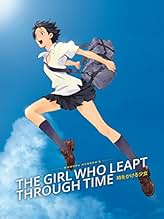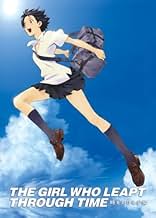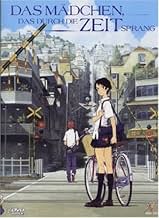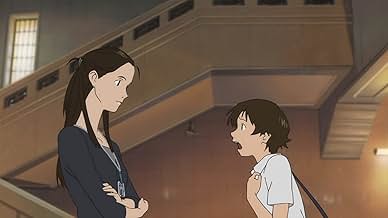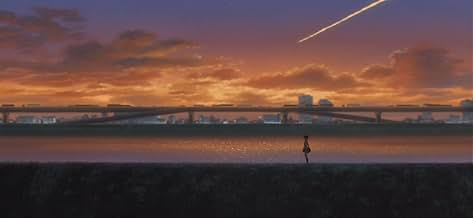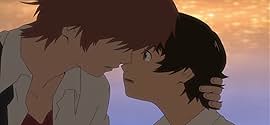CALIFICACIÓN DE IMDb
7.6/10
74 k
TU CALIFICACIÓN
Una chica de secundaria llamada Makoto adquiere el poder de viajar en el tiempo y decide usarla para sus propios beneficios personales. Pero a la vez afectando las vidas de los demás.Una chica de secundaria llamada Makoto adquiere el poder de viajar en el tiempo y decide usarla para sus propios beneficios personales. Pero a la vez afectando las vidas de los demás.Una chica de secundaria llamada Makoto adquiere el poder de viajar en el tiempo y decide usarla para sus propios beneficios personales. Pero a la vez afectando las vidas de los demás.
- Dirección
- Guionistas
- Elenco
- Premios
- 12 premios ganados y 2 nominaciones en total
- Dirección
- Guionistas
- Todo el elenco y el equipo
- Producción, taquilla y más en IMDbPro
Opiniones destacadas
10ethSin
There are about 10 Japanese films that I re-watch almost every year since their releases. "The Girl Who Leapt Through Time" is one of only three such animated films for me.
"The Girl Who Leapt Through Time" is based on a 1967 hit novel of the same title. The original work has been used in numerous film and dorama adaptations, most famous ones being the 1983 film directed by Oobayashi Nobuhiko. Instead of making just another anime adaptation and possibly becoming just another adaptation shadowed by the 1983 film, the producers took a risk by creating a spin-off movie with the setting of about 20 years after the original story. The gamble paid off big time, as the animated film went on to win at least 23 awards worldwide.
The underlying theme in this movie was "the importance of living the moment". Our protagonist was given the power to leap back into time to correct her mistakes, only to realize later that the short-term gains only lead to greater losses that followed. The story was extremely well-constructed to teach the lesson of embracing things the way they are, and never run from confrontations, because once that moment gone, you'll never get it back.
The director for this film did a phenomenal job of pacing and creating many memorable moments, but it was the live-action film screenwriter Okudera Satoko, who really made a difference for this movie by composing a story out of number of time leaps that slowly developed the main characters and made so many epic scenes possible. Many anime screenwriters fail in movies because they incorporate too many characters, as it is common practice in series, into the limited 100 minute time-frame. What's remarkable about this piece of work is that it focuses on only three main characters. Even counting the secondary cast, there are only 8 characters in total who we are given the names of. The limited number of characters not only improved character development, it also allowed the story to focus on the underlying theme.
I was actually very uncertain about the viewing this year because I started watching a lot of TV anime again since the last viewing. However, the only new flaws I've noticed was the excessive still motion in some scenes and most backgrounds, and that the protagonist was being a bit overly insensitive in few instances, which made her character a bit unrealistic. Animation is years ahead of its time, and it still is an excellent example of what happens when music is in harmony with the story/animation. The insert song by Oku Hanako, IMO, is still the best selection ever made among hundreds of Japanese films, anime, and live-action doramas I've encountered. Ending theme is a truly poignant one that really captured the mood and made the story sink in, and the music score throughout the movie has been used perfectly to enhance the drama.
"The Girl Who Leapt Through Time" is a timeless masterpiece that made me want to cherish every moment, and it's a movie I expect myself to be re-watching for many more years to come.
"The Girl Who Leapt Through Time" is based on a 1967 hit novel of the same title. The original work has been used in numerous film and dorama adaptations, most famous ones being the 1983 film directed by Oobayashi Nobuhiko. Instead of making just another anime adaptation and possibly becoming just another adaptation shadowed by the 1983 film, the producers took a risk by creating a spin-off movie with the setting of about 20 years after the original story. The gamble paid off big time, as the animated film went on to win at least 23 awards worldwide.
The underlying theme in this movie was "the importance of living the moment". Our protagonist was given the power to leap back into time to correct her mistakes, only to realize later that the short-term gains only lead to greater losses that followed. The story was extremely well-constructed to teach the lesson of embracing things the way they are, and never run from confrontations, because once that moment gone, you'll never get it back.
The director for this film did a phenomenal job of pacing and creating many memorable moments, but it was the live-action film screenwriter Okudera Satoko, who really made a difference for this movie by composing a story out of number of time leaps that slowly developed the main characters and made so many epic scenes possible. Many anime screenwriters fail in movies because they incorporate too many characters, as it is common practice in series, into the limited 100 minute time-frame. What's remarkable about this piece of work is that it focuses on only three main characters. Even counting the secondary cast, there are only 8 characters in total who we are given the names of. The limited number of characters not only improved character development, it also allowed the story to focus on the underlying theme.
I was actually very uncertain about the viewing this year because I started watching a lot of TV anime again since the last viewing. However, the only new flaws I've noticed was the excessive still motion in some scenes and most backgrounds, and that the protagonist was being a bit overly insensitive in few instances, which made her character a bit unrealistic. Animation is years ahead of its time, and it still is an excellent example of what happens when music is in harmony with the story/animation. The insert song by Oku Hanako, IMO, is still the best selection ever made among hundreds of Japanese films, anime, and live-action doramas I've encountered. Ending theme is a truly poignant one that really captured the mood and made the story sink in, and the music score throughout the movie has been used perfectly to enhance the drama.
"The Girl Who Leapt Through Time" is a timeless masterpiece that made me want to cherish every moment, and it's a movie I expect myself to be re-watching for many more years to come.
Having watched the trailers on the net for Toki wo Kakeru Shoujo (official English title: The Girl Who Leapt Through Time), I've been looking forward to it for a while. With character designs by Yoshiyuki Sadamoto, the same guy who did those for Neon Genesis Evangelion, and animation by Madhouse, Tokikake (as it is nicknamed in Japan), is a great-looking movie. Lively and interesting backgrounds, lush colours and detailed animation, it's a joy to look at. Particular mention must be made of the time-leaping effect, which gives you a sense of breathlessness. The voice acting is extremely enjoyable, with the voice actors really managing to convey their characters' personalities, while endearing them to the viewer. The music is great, with a wonderfully wistful theme song "Garnet", provided by Hanako Oku. The direction is interesting, with some really nice shots effectively conveying the more important events and scenes. Overall, I really enjoyed Toki wo Kakeru Shoujo, which is why it is such a mystery as to why it is only showing in one cinema house in all of Tokyo. With Gedo Senki generally failing to live up to people's expectations, were Tokikake shown in a few more cinemas, it could have the potential to be the surprise blockbuster of the summer. Definitely to be recommended over Gedo Senki as the anime movie of the summer.
Alert: This movie has the most fantastic background graphics, equal in quality to the very best--like cowboy bebop or something from studio ghibli (spirited away). just wonderful color of the sunsets, schools houses etc.
As a teen slice of life/tentative romance/drama the story seems like it could be cliché, but they do interesting things with it, make it more dramatic in the middle, and at the end i was satisfied. the emotional depth sort of sneaks up on you.
Sounds were well-integrated into the film and the voice actors were spot-on in their portrayals.
just a fine experience watching this on here in Asia.
Highly recommended for all, but a must for anyone who's into anime.
wow I'm gonna look out for anything by this studio and director in the future.
As a teen slice of life/tentative romance/drama the story seems like it could be cliché, but they do interesting things with it, make it more dramatic in the middle, and at the end i was satisfied. the emotional depth sort of sneaks up on you.
Sounds were well-integrated into the film and the voice actors were spot-on in their portrayals.
just a fine experience watching this on here in Asia.
Highly recommended for all, but a must for anyone who's into anime.
wow I'm gonna look out for anything by this studio and director in the future.
10oncex
This film is one of those films that comes once in every generation. The voice actors give the characters a sense of realness that makes you suffer or feel joy. The detail of the work is phenomenal and the story doesn't drag or end in a familiar way. I specially like the detail they put to little things as the sliding doors bouncing back open when Makoto tries to close them. This is one of those films that in the end it leaves you a good feeling and not guilty for spending two hours enjoying yourself. When you see this film you might have to find time to think when was the last time you saw something so good.I just wish there's a sequel for it, because I just couldn't get enough of it. But maybe is one of those stories that you wish it never ended but you know that it has to end.
P.S. Now I have to buy the DVD.
P.S. Now I have to buy the DVD.
This terrific fantasy focuses on a girl who discovers she can jump back in time, and much of the movie is a light-hearted exploration of what a teenage girl would do with that power, which is essentially relive life better, avoid uncomfortable conversations, and eat pudding. The lead character is likably average.
There are a few oddities in this movie. Some of them are because it turns out, as I learned at wikipedia, that this isn't actually the same story as the novel upon which it is based but a sequel containing a character from the original movie, which explains a lot. Apparently the original story has been made into several movies and TV series in Japan, so the assumption was probably that everyone would understand a lot of references I didn't get.
Also, towards the end, we are given little pieces of information that suggest there is a whole other story to learn, although whether that story is in the original book or whether that would be the subject of yet another narrative I don't know.
Then there's the ending, which is logically unsatisfying and yet which I ultimately found emotionally resonant. It's one of these puzzling endings that has you reading wikipedia and going through the IMDb forum posts (which offer a lot of fascinating theories).
Well worth watching.
There are a few oddities in this movie. Some of them are because it turns out, as I learned at wikipedia, that this isn't actually the same story as the novel upon which it is based but a sequel containing a character from the original movie, which explains a lot. Apparently the original story has been made into several movies and TV series in Japan, so the assumption was probably that everyone would understand a lot of references I didn't get.
Also, towards the end, we are given little pieces of information that suggest there is a whole other story to learn, although whether that story is in the original book or whether that would be the subject of yet another narrative I don't know.
Then there's the ending, which is logically unsatisfying and yet which I ultimately found emotionally resonant. It's one of these puzzling endings that has you reading wikipedia and going through the IMDb forum posts (which offer a lot of fascinating theories).
Well worth watching.
¿Sabías que…?
- TriviaThis movie is an indirect adaptation of Yasutaka Tsutsui's novel "The Girl Who Leapt Through Time" - the main character's aunt is Yoshiyama Kazuko, the protagonist of the novel.
- ErroresSpoiler: During the time-stop sequence Chiaki laments that he will not be able to see the painting he has come to the past for because it is in restoration and he will not be around the next day when it is put on the wall. But Makoto knows that the picture is worked on by her aunt and so they could just go upstairs and take a look at it (they may find the door locked but the possibility is not even mentioned). Chiaki's last jump could not have erased that memory because Makoto's knowledge predates the event.
- Citas
Yuri Hayakawa: [Makoto Leaves the room, then Yuri watches the Blackboard] Makoto: Time waits for no one
- ConexionesFeatured in Glass Reflection: The Girl Who Leapt Through Time (2010)
Selecciones populares
Inicia sesión para calificar y agrega a la lista de videos para obtener recomendaciones personalizadas
Detalles
Taquilla
- Total a nivel mundial
- USD 1,535,976
- Tiempo de ejecución
- 1h 38min(98 min)
- Color
- Mezcla de sonido
- Relación de aspecto
- 1.78 : 1
Contribuir a esta página
Sugiere una edición o agrega el contenido que falta


